新概念英语第一册lesson123课件(共51张PPT)
文档属性
| 名称 | 新概念英语第一册lesson123课件(共51张PPT) |  | |
| 格式 | pptx | ||
| 文件大小 | 78.5MB | ||
| 资源类型 | 教案 | ||
| 版本资源 | 新概念英语 | ||
| 科目 | 英语 | ||
| 更新时间 | 2023-10-29 14:28:54 | ||
图片预览

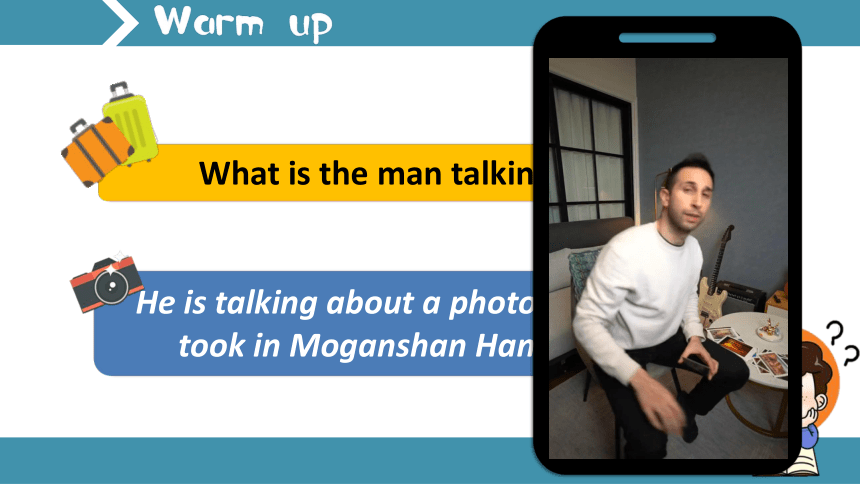
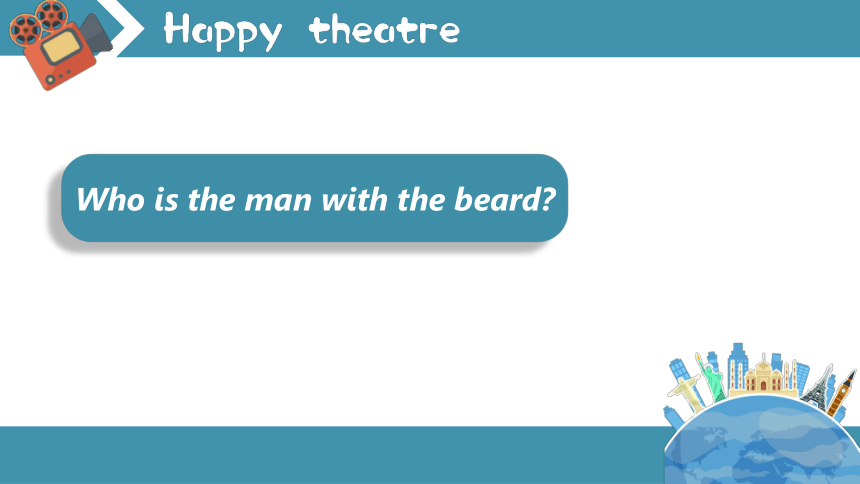
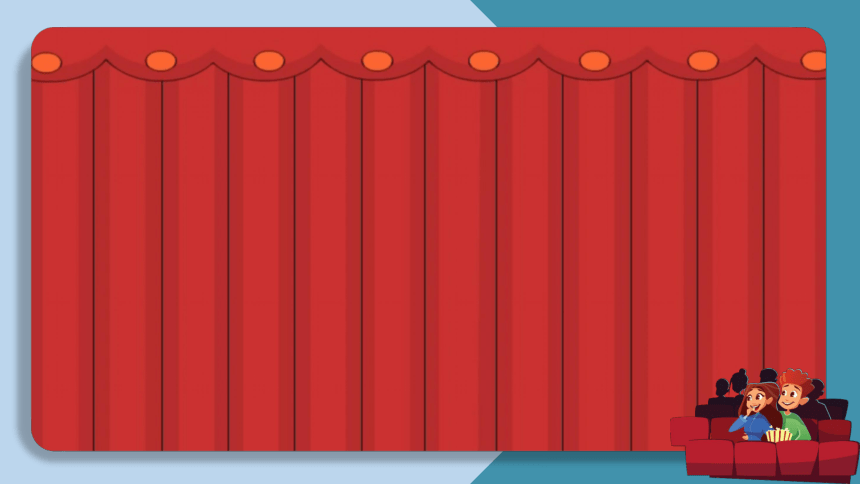
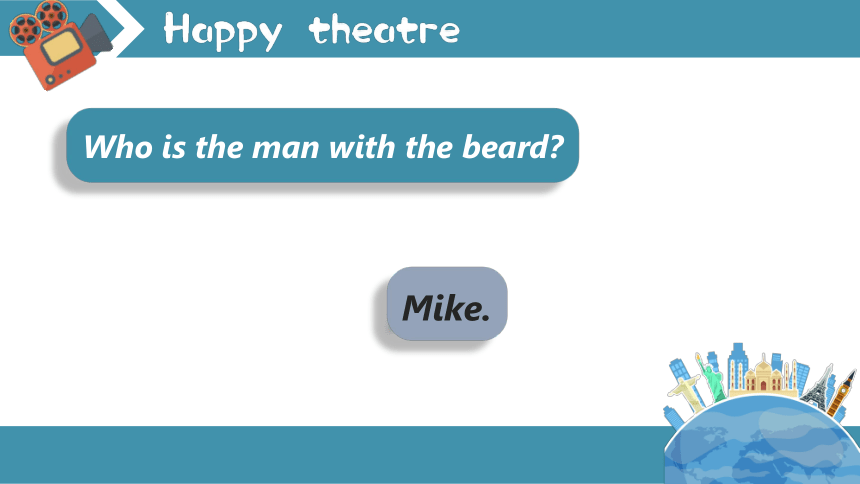
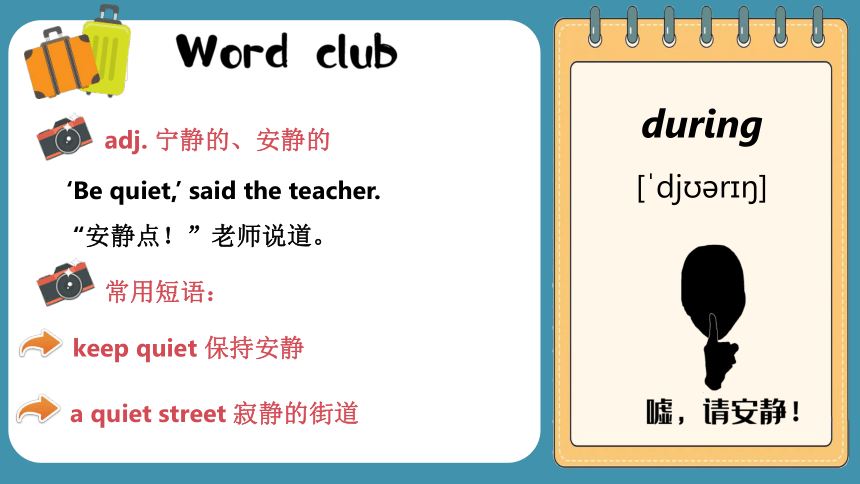
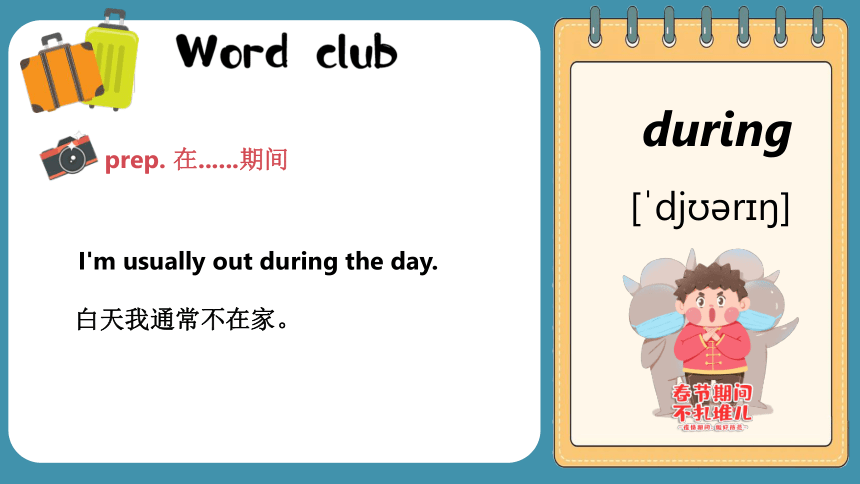
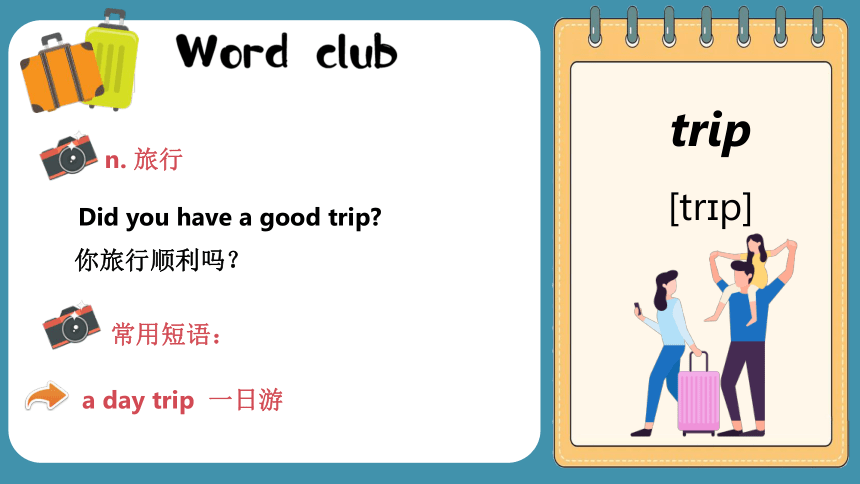

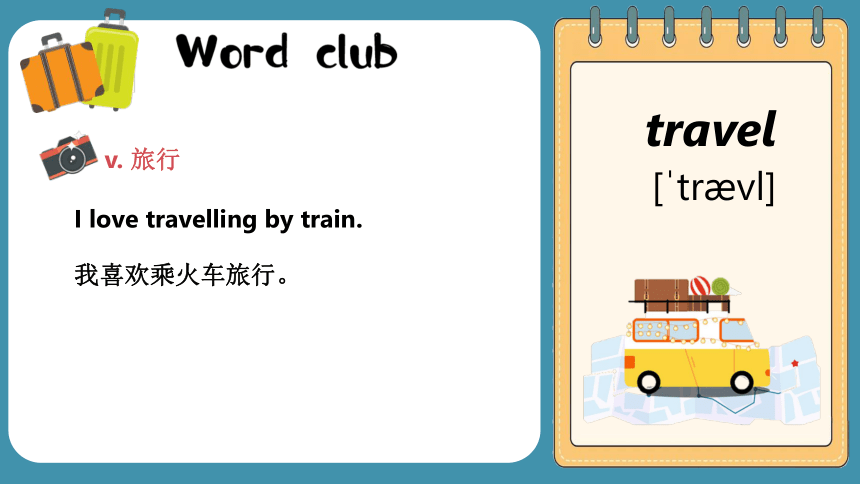
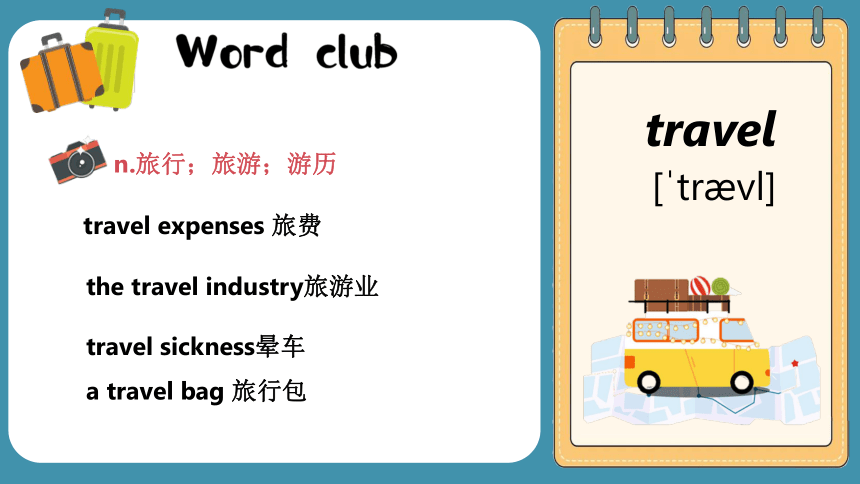
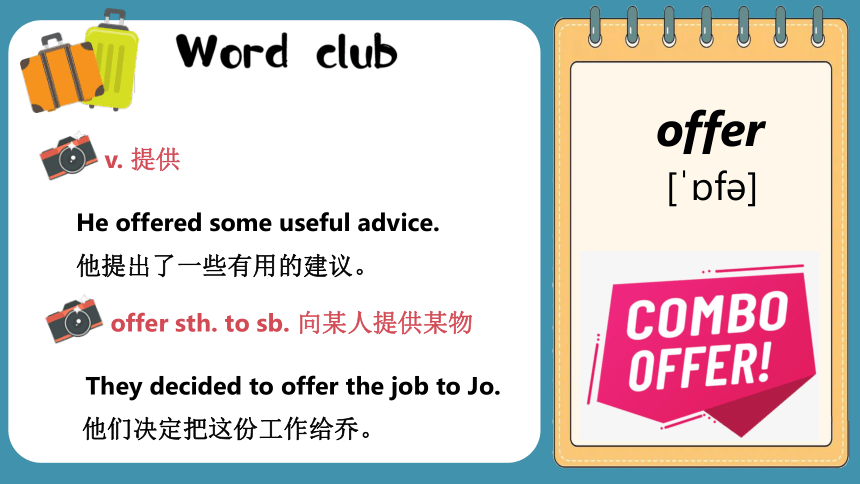
文档简介
(共51张PPT)
Lesson123
A trip to Australia
He is talking about a photo which he took in Moganshan Hangzhou.
What is the man talking about
Who is the man with the beard
Mike.
Who is the man with the beard
adj. 宁静的、安静的
during
[ dj r ]
‘Be quiet,’ said the teacher.
“安静点!”老师说道。
常用短语:
keep quiet 保持安静
a quiet street 寂静的街道
I'm usually out during the day.
白天我通常不在家。
prep. 在......期间
during
[ dj r ]
Did you have a good trip
你旅行顺利吗?
n. 旅行
trip
[tr p]
常用短语:
a day trip 一日游
trip
[tr p]
常用短语:
a boat/coach trip 乘船 / 长途汽车旅行
a business trip 出差
school trip 学校旅行
a round-the-world trip环球旅行
I love travelling by train.
我喜欢乘火车旅行。
v. 旅行
travel
[ tr vl]
travel
[ tr vl]
n.旅行;旅游;游历
travel expenses 旅费
the travel industry旅游业
travel sickness晕车
a travel bag 旅行包
v. 提供
offer
[ f ]
He offered some useful advice.
他提出了一些有用的建议。
offer sth. to sb. 向某人提供某物
They decided to offer the job to Jo.
他们决定把这份工作给乔。
offer
[ f ]
offer sb. sth. to do sth.
向某人提供某物做某事
Taylor offered him 500 dollars to do the work.
泰勒愿出500元雇他做这件工作。
job
[d b]
He's trying to get a job .
他正在找工作。
n.工作
常用短语:
a summer job 暑期工作
job
[d b]
常用短语:
a part-time job 兼职
take a job 工作
out of a job 失业
lose one’s job 丢了工作
Can you guess his age
你能猜出他的年龄吗?
v. 猜
guess
[ɡes]
You'll never guess what she told me.
你永远猜不到她对我说了什么。
v.猜中;想,以为
guess
[ɡes]
He didn't see me, I guess.
我想他没看见我。
Go on! Have a guess!
来呀!猜猜看!
n.猜测;猜想
Tomatoes grow best in direct sunlight. 西红柿在阳光直射下长得最好。
v. 长,让......生长
(grew[ɡru ] , grown[ɡr n])
grow
[ɡr ]
grow
[ɡr ]
The company is growing bigger all the time.
这家公司在不断地扩大。
v.扩大;增强;留长
I've decided to grow my hair.
我已决定留长发。
n. (下巴上的)胡子,络腮胡子
beard
[b d]
He's decided to grow a beard.
他已经决定蓄胡子。
during
trip
travel
offer
job
guess
grow
beard
MIKE: Look, Scott.
This is a photograph I took during my trip to Australia.
SCOTT: Let me see it, Mike. This is a good photograph.
Who are these people
MIKE: They're people I met during the trip.
That's the ship we travelled on.
SCOTT: What a beautiful ship! Who's this
MIKE: That's the man I told you about.
Remember
This is a photograph I took during my trip to Australia. 这是我到澳大利亚旅行时拍的一张照片。
这句话中,I took during my trip to Australia是一个定语从句,用来修饰 a photograph 。由于所修饰的名词在从句中作动词took的宾语,因此,引导从句的关系代词which或that往往可以省略。本课中类似的句子还有:
That's the ship we travelled on.
这是我们所乘坐的那条船。
This is a photograph I took during my trip to Australia. 这是我到澳大利亚旅行时拍的一张照片。
a trip to... 一次去……的旅行
You've won yourself a trip to New York.
你赢得了一次纽约之旅。
They took a trip to Thailand last year.
他们去年去泰国旅行了。
MIKE: Look, Scott.
This is a photograph I took during my trip to Australia.
SCOTT: Let me see it, Mike. This is a good photograph.
Who are these people
MIKE: They're people I met during the trip.
That's the ship we travelled on.
SCOTT: What a beautiful ship! Who's this
MIKE: That's the man I told you about.
Remember
They're people I met during the trip.
他们是我旅行时认识的人。
在本句中,I met during the trip是一个定语从句,修饰前面的先行词people。如果先行词是人,那么关系代词可以用who, whom或that; 但由于先行词people在从句中作met的宾语,因此,一般可以省略。本课中,类似的句子还有:
That's the man I told you about.
这就是我跟你说过的那个人。
MIKE: Look, Scott.
This is a photograph I took during my trip to Australia.
SCOTT: Let me see it, Mike. This is a good photograph.
Who are these people
MIKE: They're people I met during the trip.
That's the ship we travelled on.
SCOTT: What a beautiful ship! Who's this
MIKE: That's the man I told you about.
Remember
What a beautiful ship! 多漂亮的船啊!
这是一个感叹句,表明说话人的强烈感情。what和how都能引导感叹句,其结构如下:
What a lovely girl (she is) !
她是一个多么可爱的女孩啊!
what引导的感叹句:
Ⅰ. What a/ an +形容词+可数名词单数 (+主语+谓语) !
What a beautiful ship! 多漂亮的船啊!
What beautiful flowers they are!
多漂亮的花啊!
what引导的感叹句:
Ⅱ. What+ 形容词+不可数名词/ 可数名词复数(+主语+谓语) !
What pleasant weather it is!
多好的天气啊!
What a beautiful ship! 多漂亮的船啊!
How blue the sky is! 天空多蓝呀!
形容词
how引导的感叹句:
How +形容词/ 副词+主语+谓语!
How quickly he drives! 他开得多快啊!
副词
SCOTT: Ah yes. The one who offered you a job in Australia.
MIKE: That's right.
SCOTT: Who's this
MIKE: Guess!
SCOTT: It's not you, is it
MIKE: That's right. I grew a beard during the trip,
but I shaved it off when I came home.
SCOTT: Why did you shave it off
MIKE: My wife didn't like it!
The one who offered you a job in Australia.
就是在澳大利亚给你工作做的那个人。
句中的主语“The one”代指上文所提到的“the man”,以免重复。
在本句中,who offered you a job in Australia是一个定语从句,修饰前面的名词the one。由于被修饰的名词是人并且在从句中作主语,所以关系代词用who, 而且不可以省略。再如:
The one who keeps his word is popular everywhere.
信守诺言的人在任何地方都很受欢迎。
The man who is tired of London is tired of life. 厌倦伦敦等于厌倦生活。
SCOTT: Ah yes. The one who offered you a job in Australia.
MIKE: That's right.
SCOTT: Who's this
MIKE: Guess!
SCOTT: It's not you, is it
MIKE: That's right. I grew a beard during the trip,
but I shaved it off when I came home.
SCOTT: Why did you shave it off
MIKE: My wife didn't like it!
It's not you, is it 这不是你,对吗?
这是一个反义疑问句。它是由两部分组成,逗号前是一个陈述句,逗号之后是一个简略问句。如果前面一部分陈述句是肯定形式,简略问句就要用否定形式;如果前一部分是否定形式,后一部分则用肯定形式。反义疑问句前后的人称和时态要保持一致,回答要根据实际情况来回答。如:
They work very hard, don’t they
他们工作很努力,对吗?
English isn’t easy, is it
英语并不简单,是不是?
SCOTT: Ah yes. The one who offered you a job in Australia.
MIKE: That's right.
SCOTT: Who's this
MIKE: Guess!
SCOTT: It's not you, is it
MIKE: That's right. I grew a beard during the trip,
but I shaved it off when I came home.
SCOTT: Why did you shave it off
MIKE: My wife didn't like it!
That’s right. 对。
这是对上句It's not you, is it 的回答,上句虽然用否定形式提问,但回答则根据事实来决定是用肯定还是否定形式。That’s right.是肯定的回答,相当于Yes, it is. (那正是我)。
SCOTT: Ah yes. The one who offered you a job in Australia.
MIKE: That's right.
SCOTT: Who's this
MIKE: Guess!
SCOTT: It's not you, is it
MIKE: That's right. I grew a beard during the trip,
but I shaved it off when I came home.
SCOTT: Why did you shave it off
MIKE: My wife didn't like it!
I grew a beard during the trip, but I shaved it off when I came home.我在旅行时留了胡子,但我回到家时就把它刮了。
grow a beard 留胡子, grow与头发、胡须等搭配时,表示“(使)留长,蓄长”。
I've decided to let my hair grow.
我已决定留长发。
I didn't recognize him because he's grown a beard.我没认出他来, 因为他留胡子了。
I grew a beard during the trip, but I shaved it off when I came home.我在旅行时留了胡子,但我回到家时就把它刮了。
but后面的分句中还包含一个when引导的时间状语从句,表示“在......时候”,其从句的动作和主句的动作既可同时发生,也可以是之后发生。再如:
When we got to the cinema, the film had stated. (从句在主句之后发生)
当我们到达电影院时,电影已经开始了。
When he was a child, he was always trying out new ideas. (从句和主句同时发生)
他小时候常常会尝试一些新的想法。
Lesson116
Every,no,any
and some
Would you like to dub for the story Please prepare with your partners.
MIKE: Look, Scott. This is a ____________ I took _________ my _____ to Australia.
SCOTT: ______ me see it, Mike.
photograph
SCOTT: This is a ______ photograph. ______ are these ____________
MIKE: They're people I ______ ____________ the trip.
MIKE: That's the ship we ____________ ______.
SCOTT: ____________beautiful ship!
trip
during
Let
good
Who
people
met during
travelled
on
What a
SCOTT: Who's this
MIKE: That's the man I _________ you _________. Remember
SCOTT: Ah yes. The one _________ _________ you a job in Australia.
MIKE: That's right.
told
SCOTT: Who's _________ MIKE: Guess!
SCOTT: It's _________ you, _________ it MIKE: That's _________.
who offered
about
this
not
is
right
MIKE: I __________ a __________ during the trip,
but I __________ it __________ when I __________ home.
grew
SCOTT: __________ did you shave it off
MIKE: My wife __________ like it!
shaved
beard
off
came
Why
didn't
Lesson123
A trip to Australia
He is talking about a photo which he took in Moganshan Hangzhou.
What is the man talking about
Who is the man with the beard
Mike.
Who is the man with the beard
adj. 宁静的、安静的
during
[ dj r ]
‘Be quiet,’ said the teacher.
“安静点!”老师说道。
常用短语:
keep quiet 保持安静
a quiet street 寂静的街道
I'm usually out during the day.
白天我通常不在家。
prep. 在......期间
during
[ dj r ]
Did you have a good trip
你旅行顺利吗?
n. 旅行
trip
[tr p]
常用短语:
a day trip 一日游
trip
[tr p]
常用短语:
a boat/coach trip 乘船 / 长途汽车旅行
a business trip 出差
school trip 学校旅行
a round-the-world trip环球旅行
I love travelling by train.
我喜欢乘火车旅行。
v. 旅行
travel
[ tr vl]
travel
[ tr vl]
n.旅行;旅游;游历
travel expenses 旅费
the travel industry旅游业
travel sickness晕车
a travel bag 旅行包
v. 提供
offer
[ f ]
He offered some useful advice.
他提出了一些有用的建议。
offer sth. to sb. 向某人提供某物
They decided to offer the job to Jo.
他们决定把这份工作给乔。
offer
[ f ]
offer sb. sth. to do sth.
向某人提供某物做某事
Taylor offered him 500 dollars to do the work.
泰勒愿出500元雇他做这件工作。
job
[d b]
He's trying to get a job .
他正在找工作。
n.工作
常用短语:
a summer job 暑期工作
job
[d b]
常用短语:
a part-time job 兼职
take a job 工作
out of a job 失业
lose one’s job 丢了工作
Can you guess his age
你能猜出他的年龄吗?
v. 猜
guess
[ɡes]
You'll never guess what she told me.
你永远猜不到她对我说了什么。
v.猜中;想,以为
guess
[ɡes]
He didn't see me, I guess.
我想他没看见我。
Go on! Have a guess!
来呀!猜猜看!
n.猜测;猜想
Tomatoes grow best in direct sunlight. 西红柿在阳光直射下长得最好。
v. 长,让......生长
(grew[ɡru ] , grown[ɡr n])
grow
[ɡr ]
grow
[ɡr ]
The company is growing bigger all the time.
这家公司在不断地扩大。
v.扩大;增强;留长
I've decided to grow my hair.
我已决定留长发。
n. (下巴上的)胡子,络腮胡子
beard
[b d]
He's decided to grow a beard.
他已经决定蓄胡子。
during
trip
travel
offer
job
guess
grow
beard
MIKE: Look, Scott.
This is a photograph I took during my trip to Australia.
SCOTT: Let me see it, Mike. This is a good photograph.
Who are these people
MIKE: They're people I met during the trip.
That's the ship we travelled on.
SCOTT: What a beautiful ship! Who's this
MIKE: That's the man I told you about.
Remember
This is a photograph I took during my trip to Australia. 这是我到澳大利亚旅行时拍的一张照片。
这句话中,I took during my trip to Australia是一个定语从句,用来修饰 a photograph 。由于所修饰的名词在从句中作动词took的宾语,因此,引导从句的关系代词which或that往往可以省略。本课中类似的句子还有:
That's the ship we travelled on.
这是我们所乘坐的那条船。
This is a photograph I took during my trip to Australia. 这是我到澳大利亚旅行时拍的一张照片。
a trip to... 一次去……的旅行
You've won yourself a trip to New York.
你赢得了一次纽约之旅。
They took a trip to Thailand last year.
他们去年去泰国旅行了。
MIKE: Look, Scott.
This is a photograph I took during my trip to Australia.
SCOTT: Let me see it, Mike. This is a good photograph.
Who are these people
MIKE: They're people I met during the trip.
That's the ship we travelled on.
SCOTT: What a beautiful ship! Who's this
MIKE: That's the man I told you about.
Remember
They're people I met during the trip.
他们是我旅行时认识的人。
在本句中,I met during the trip是一个定语从句,修饰前面的先行词people。如果先行词是人,那么关系代词可以用who, whom或that; 但由于先行词people在从句中作met的宾语,因此,一般可以省略。本课中,类似的句子还有:
That's the man I told you about.
这就是我跟你说过的那个人。
MIKE: Look, Scott.
This is a photograph I took during my trip to Australia.
SCOTT: Let me see it, Mike. This is a good photograph.
Who are these people
MIKE: They're people I met during the trip.
That's the ship we travelled on.
SCOTT: What a beautiful ship! Who's this
MIKE: That's the man I told you about.
Remember
What a beautiful ship! 多漂亮的船啊!
这是一个感叹句,表明说话人的强烈感情。what和how都能引导感叹句,其结构如下:
What a lovely girl (she is) !
她是一个多么可爱的女孩啊!
what引导的感叹句:
Ⅰ. What a/ an +形容词+可数名词单数 (+主语+谓语) !
What a beautiful ship! 多漂亮的船啊!
What beautiful flowers they are!
多漂亮的花啊!
what引导的感叹句:
Ⅱ. What+ 形容词+不可数名词/ 可数名词复数(+主语+谓语) !
What pleasant weather it is!
多好的天气啊!
What a beautiful ship! 多漂亮的船啊!
How blue the sky is! 天空多蓝呀!
形容词
how引导的感叹句:
How +形容词/ 副词+主语+谓语!
How quickly he drives! 他开得多快啊!
副词
SCOTT: Ah yes. The one who offered you a job in Australia.
MIKE: That's right.
SCOTT: Who's this
MIKE: Guess!
SCOTT: It's not you, is it
MIKE: That's right. I grew a beard during the trip,
but I shaved it off when I came home.
SCOTT: Why did you shave it off
MIKE: My wife didn't like it!
The one who offered you a job in Australia.
就是在澳大利亚给你工作做的那个人。
句中的主语“The one”代指上文所提到的“the man”,以免重复。
在本句中,who offered you a job in Australia是一个定语从句,修饰前面的名词the one。由于被修饰的名词是人并且在从句中作主语,所以关系代词用who, 而且不可以省略。再如:
The one who keeps his word is popular everywhere.
信守诺言的人在任何地方都很受欢迎。
The man who is tired of London is tired of life. 厌倦伦敦等于厌倦生活。
SCOTT: Ah yes. The one who offered you a job in Australia.
MIKE: That's right.
SCOTT: Who's this
MIKE: Guess!
SCOTT: It's not you, is it
MIKE: That's right. I grew a beard during the trip,
but I shaved it off when I came home.
SCOTT: Why did you shave it off
MIKE: My wife didn't like it!
It's not you, is it 这不是你,对吗?
这是一个反义疑问句。它是由两部分组成,逗号前是一个陈述句,逗号之后是一个简略问句。如果前面一部分陈述句是肯定形式,简略问句就要用否定形式;如果前一部分是否定形式,后一部分则用肯定形式。反义疑问句前后的人称和时态要保持一致,回答要根据实际情况来回答。如:
They work very hard, don’t they
他们工作很努力,对吗?
English isn’t easy, is it
英语并不简单,是不是?
SCOTT: Ah yes. The one who offered you a job in Australia.
MIKE: That's right.
SCOTT: Who's this
MIKE: Guess!
SCOTT: It's not you, is it
MIKE: That's right. I grew a beard during the trip,
but I shaved it off when I came home.
SCOTT: Why did you shave it off
MIKE: My wife didn't like it!
That’s right. 对。
这是对上句It's not you, is it 的回答,上句虽然用否定形式提问,但回答则根据事实来决定是用肯定还是否定形式。That’s right.是肯定的回答,相当于Yes, it is. (那正是我)。
SCOTT: Ah yes. The one who offered you a job in Australia.
MIKE: That's right.
SCOTT: Who's this
MIKE: Guess!
SCOTT: It's not you, is it
MIKE: That's right. I grew a beard during the trip,
but I shaved it off when I came home.
SCOTT: Why did you shave it off
MIKE: My wife didn't like it!
I grew a beard during the trip, but I shaved it off when I came home.我在旅行时留了胡子,但我回到家时就把它刮了。
grow a beard 留胡子, grow与头发、胡须等搭配时,表示“(使)留长,蓄长”。
I've decided to let my hair grow.
我已决定留长发。
I didn't recognize him because he's grown a beard.我没认出他来, 因为他留胡子了。
I grew a beard during the trip, but I shaved it off when I came home.我在旅行时留了胡子,但我回到家时就把它刮了。
but后面的分句中还包含一个when引导的时间状语从句,表示“在......时候”,其从句的动作和主句的动作既可同时发生,也可以是之后发生。再如:
When we got to the cinema, the film had stated. (从句在主句之后发生)
当我们到达电影院时,电影已经开始了。
When he was a child, he was always trying out new ideas. (从句和主句同时发生)
他小时候常常会尝试一些新的想法。
Lesson116
Every,no,any
and some
Would you like to dub for the story Please prepare with your partners.
MIKE: Look, Scott. This is a ____________ I took _________ my _____ to Australia.
SCOTT: ______ me see it, Mike.
photograph
SCOTT: This is a ______ photograph. ______ are these ____________
MIKE: They're people I ______ ____________ the trip.
MIKE: That's the ship we ____________ ______.
SCOTT: ____________beautiful ship!
trip
during
Let
good
Who
people
met during
travelled
on
What a
SCOTT: Who's this
MIKE: That's the man I _________ you _________. Remember
SCOTT: Ah yes. The one _________ _________ you a job in Australia.
MIKE: That's right.
told
SCOTT: Who's _________ MIKE: Guess!
SCOTT: It's _________ you, _________ it MIKE: That's _________.
who offered
about
this
not
is
right
MIKE: I __________ a __________ during the trip,
but I __________ it __________ when I __________ home.
grew
SCOTT: __________ did you shave it off
MIKE: My wife __________ like it!
shaved
beard
off
came
Why
didn't
同课章节目录
